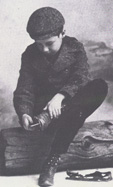 Family Folklore
Family Folklore
How to Collect Your Own Family Folklore
Getting Started
Because family folklore belongs to a living family, it is constantly evolving. Each generation will forget and alter the lore that it has received; on the other hand, that same generation will add new verbal lore and new traditions. This creative aspect of family folklore affects the researcher in several ways.
First, no matter how hard you try, you will never record the entire body of your family's folklore since there will never be a time in which it will be totally static. Don't despair. Get down what you can and encourage other family members to do the same. Just think of collecting family folklore as a pastime for which you have an infinite supply of raw material close at hand.
Second, think about your time orientation. The family folklorist cannot be so absorbed in preserving the past that he neglects to record the present. Keep your eyes, ears, and mind open. A tradition does not have to be old to be worth recording. In fact, a good part of any family's tradition is ephemeral and may not last long enough to pass from one generation to another. Collecting family folklore is one case in which too much is better than too little. Tapes can be edited and transcripts can be discarded, but the tradition, story, or expression that you neglect to record today may be lost.
Finally, remember that family folklore exists as part of the day-to-day living of a family, changing and moving with that family. To separate it abruptly from this natural context would rob it of its vitality and its existence as folklore. It is essential to remember that the story itself--including where, when, and how it is told--is as important as the information it conveys. This is the essential distinction between family folklore and the closely related disciplines of genealogy and family history. The following suggestions are designed to help you focus on these folkloric aspects of your family.
As self-appointed family folklorist you now have two tasks ahead of you: to learn your family's folklore and to record it for others to enjoy.